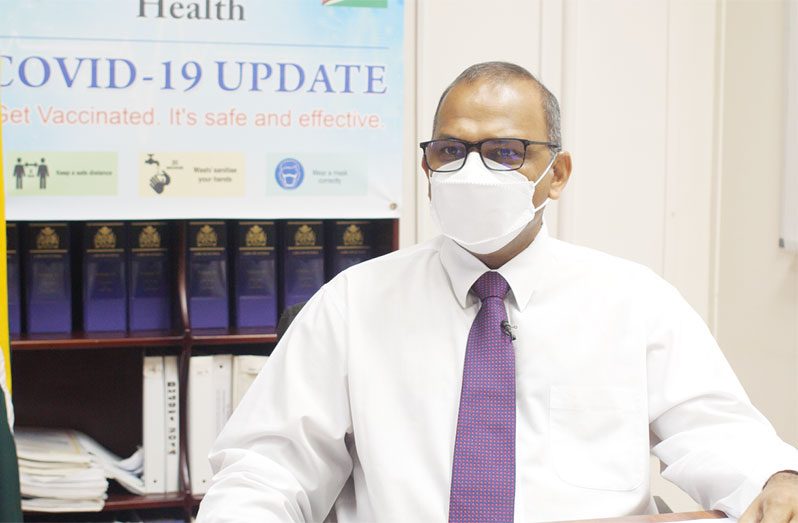–Health Minister says
HEALTH Minister, Dr. Frank Anthony, has advised that persons must “act sensibly” to curb the spread of the deadly COVID-19 virus.
Speaking during Wednesday’s edition of the COVID-19 update, Dr. Anthony explained that acting sensibly means persons must “take on personal responsibility” and adhere to the COVID-19 guidelines.
He said that persons must ensure they wear their masks when in public, sanitise regularly, social distance and most importantly, ensure they are vaccinated.
“[Social distancing] seems like a very difficult thing to do during this holiday period because everybody wants to crowd, walk in the crowd and behave like it’s normal, but that’s not taking personal responsibility, that’s being highly irresponsible,” he said.
Further, Dr. Anthony reminded that as part of the Gazetted COVID-19 Measures, businesses also have a responsibility to ensure persons who enter their premises produce their vaccination card indicating they are fully vaccinated before entering.
“Unfortunately, many businesses are choosing to relax these measures and because of their posture – not helping to prevent the spread, we can see an increase in cases,” he said while highlighting that there is no necessity for persons to go to certain places “just to hang out.”
The minister added: “This is not a job for the Ministry of Health alone, this is for everyone in the country. If you want to see a reduction in cases, if you want to see a reduction in hospitalisation, if you want to see a reduction in deaths, then all of us must be involved … take personal responsibility and … do what is right.”
The latest COVID-19 statistics show that some 409,582 adults and 30,131 adolescents have received their first dose of one of the vaccines the country has made available to citizens.
These numbers, when broken down, mean that 79.8 per cent of the country’s adult population and 41.3 per cent of its adolescent population or persons between the ages of 12 to 18 years have received their first shot of a COVID-19 ‘jab’.
In terms of second doses, the statistics show that 57 per cent of the adult population is fully vaccinated, representing some 292,173 persons, while 21,412 adolescents received their second shot, representing 29.4 per cent of that population.
With the exception of the Johnson and Johnson vaccine, for persons to be considered fully vaccinated with the available vaccines, namely, AstraZeneca, Sinopharm, Sputnik V and Pfizer for adolescents, they must be administered both components of those vaccines.
The Ministry of Health has also rolled out its booster shot campaign whereby persons who are fully inoculated could receive a third, booster shot. To date, some 10,076 booster doses have been administered nationally.
Dr. Anthony related that Regions Two, Eight and 10 have been “lagging” behind the national average of persons vaccinated against the COVID-19 virus as those regions are “way below the national average” for first, second and booster doses.
“I’ll like to make an appeal because as you know with the looming threat of Omicron one way to keep yourself safe is to make sure you’re vaccinated. Those who haven’t received any vaccine right now, we’re encouraging them to make sure that they can get their first dose as soon as possible,” he said.
Further, he related that persons who received their first dose but did not return for their second dose are not considered fully vaccinated, and encouraged that those persons take their second dose. He also appealed to persons to take their booster shot as immunity produced by the vaccines eventually wear off.
“It is important that you get your booster shot because with Omicron, we are seeing persons who have had two doses but six months would have passed that your antibodies would start dropping and in six months’ time you can get back infected if you are exposed to the virus,” Dr. Anthony said.



.jpg)











